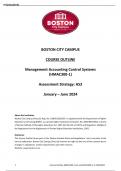Exam (elaborations)
Management Accounting Control Systems (HMAC300-1) Assessment Strategy: AS3 January – June 2024
- Course
- Institution
Management Accounting Control Systems (HMAC300-1) Assessment Strategy: AS3 January – June 2024 CONTENTS 1. COURSE INTRODUCTION 4 1.1 Overview 1.2 The Module 1.3 Notional Hours 1.4 Introduction to SAQA, QCs and the NQF 2. CRITICAL OUTCOMES OF THE LEARNING PROGRAMME 8 3. TEACHING, LEARN...
[Show more]



